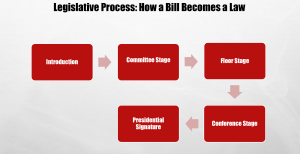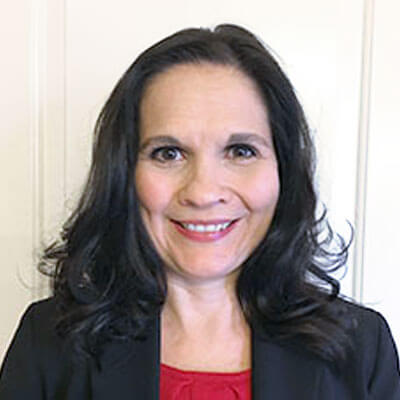Have you ever wondered about the steps of the legislative process? Maybe you’ve even asked yourself how a bill becomes a law? The legislative process is an important aspect of our American governmental system and an area that my American Government course with Excelsior Classes explores. American Government students have the opportunity to learn the legislative process in detail while participating in a Mock Congress at the end of the semester.
So, what are the steps of the legislative process?
Introduction, Committee, and Floor Stages of the Legislative Process:
The complicated legislative process actually begins very simply – an idea must be born. Citizens, congressmen, or members of congressional committees may have an idea for a law based upon everyday occurrences. If the idea is meritorious, a congressman or congressional committee member will then introduce the idea, in a bill format, to his chamber of Congress. Generally, bills may be introduced in either the House or the Senate.
After the bill is introduced, it is then forwarded to a committee for debate and argument. At this stage of the legislative process, public hearings are held so the opinions of the people may be heard and considered. Interestingly, most bills are rejected and never move beyond the committee stage. For those bills approved, the next step in the legislative process is presenting the bill to Congress for debate. If the bill is introduced in the Senate, for example, it will be debated and voted upon in the Senate. If the bill is initially introduced in the House of Representatives, it will be debated and voted upon in the House.
It is important to note that at any time prior to the final vote of a bill, citizens may contact their congressmen to have their voices heard. Assuming the bill passes, it is then sent to the other chamber of Congress for debate and voting. The entire legislative process then begins again in the second chamber of Congress.
Conference Stage and Presidential Signature or Veto:
Once both chambers have agreed on an identical form of the bill, with all provisions matching, the bill is then sent to the President for his approval in the final stage of the legislative process. In the event that the provisions of the bill do not match, a conference committee composed of members from both chambers of Congress must resolve the differences between the two versions. The revised bill must then be accepted by both chambers.
At this point, the President may sign the bill into law or veto the bill. Should the President determine that a veto is appropriate, the bill returns to Congress where it may be voted upon again. Should the bill receive a 2/3 vote of approval by both chambers of Congress, the bill will still become a law. Nevertheless, if a bill is vetoed by the President, it is more than likely that the bill will die.
It is noteworthy that only about 3% of more than 5,000 bills introduced in Congress each year actually become laws. The legislative process is complicated and time consuming to ensure that “We the People” have an opportunity to be heard. Thomas Jefferson once wrote in a letter to George Washington, “Delay is preferable to error.” These are wise words that are still applicable today.
About the Author
Ann LeBlanc loves learning and deep discussions. She received her Juris Doctorate from the Paul M. Hebert Law Center at Louisiana State University in Baton Rouge, Louisiana. She has a B.S. degree in finance, and is licensed to practice law in the states of Texas and Louisiana. Ann’s experience includes many facets of the legal field and she has argued and written legal briefs at both the state district and appellate court levels in Texas and Louisiana and has also represented clients in Federal court. Ann is also an author and has distinguished herself in the authoring of legal publications and the presentation of seminars for clients and organizations such as the National Business Institute and various insurance agencies.
Ann fulfills her love of learning, however, by teaching. Ann is currently an adjunct professor with LeTourneau University where she teaches American Government and Criminal Justice to dual credit students of Excelsior Classes. Ann has also served as an Adjunct Professor at the University of Louisiana – Lafayette, teaching Business Law. Her passion for education extends to the home, where she homeschools her own children employing the Socratic method. A keen lover of logic, Ann is passionate about teaching critical thinking skills and empowering today’s youth with the ability to analyze the problems of tomorrow, to ensure that our God given rights and freedoms remain unalienable.





